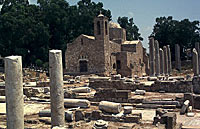Cyprus

- © UNESCO Anthony Lacoudre
- The tombs of the kings, Paphos
Education is one of the principal areas of cooperation between Cyprus and UNESCO.
The 2005 Education for All (EFA)Global Monitoring Report said Cyprus was one of the countries likely to achieve all the aims set at the World Education Forum in Dakar in April 2000. The country invests a great deal of effort in a number of education projects. In 2003, it took part in The Truce Story, a project which led to the development of educational resources to teach key principles such as tolerance, cooperation and respect. Additionally, the University of Cyprus is one of the higher education institutions which have created the Avicenna Virtual Campus project, which is designed to fill the gap in scientific and technological education in the Mediterranean region, by using information and communication technologies (ICT). By being part of this scheme, Cyprus is able to play an important role in the Euro-Mediterranean region.
Cyprus joined UNESCO on February 6, 1961. Ever since, it has worked within the Organization to promote intercultural dialogue in the Mediterranean region. In 2004, a UNESCO Chair on Cultural Diversity and Intercultural Dialogue for a Culture of Peace was created.
The site of Paphos, a former centre of the cult of pre-Hellenic deities, was inscribed on the UNESCO World Heritage List in 1980. The remains of villas, palaces, theatres and fortresses give the site exceptional architectural and historic value which Cyprus has been trying to conserve with UNESCO's help since 2003.
Information
Properties in Cyprus inscribed on the World Heritage List

